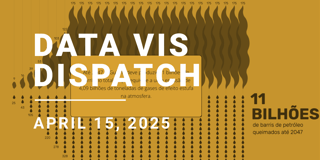Data Vis Dispatch, July 30
Welcome back to the 153rd edition of the Data Vis Dispatch! Every week, we publish a collection of the best small and large data visualizations we find, especially from news organizations — to celebrate data journalism, data visualization, simple charts, elaborate maps, and their creators.
Recurring topics this week include the Olympics, childcare, and environmental crime.
The Olympic Games in Paris take first place in the most frequent data visualizations this week. We're taking a step-by-step look at them: Last Friday, for the first time, the opening ceremony took place on a river. Despite a rail sabotage, everything went according to plan:

Tournaments were recapitulated and countries asked themselves which disciplines they had the best chance of winning:
![Le Monde: <strong><a href="https://www.lemonde.fr/les-decodeurs/article/2024/07/27/jo-paris-2024-quelles-sont-les-chances-de-medailles-pour-les-sportifs-francais_6259123_4355770.html">JO Paris 2024 : quelles sont les chances de médailles pour les sportifs français ?</a></strong> [<em>Paris 2024 Olympics: what are the chances of medals for French athletes?</em>], July 27](https://datawrapper.de/cdn-cgi/image/quality=85,width=1420,f=auto,fit=cover/https://kirby.datawrapper.de/media/pages/blog/data-vis-dispatch-july-30-2024/11f623146a-1740123224/image3-5.png)
Reference books for each sport discipline and live medal trackers were created:



Let's not forget the past winners. Despite China catching up, the U.S. still holds the most gold medals. But if you change the way of measuring athletic prowess, the result looks completely different:
![Folha de S.Paulo: <strong><a href="https://www1.folha.uol.com.br/esporte/2024/07/veja-a-disputa-de-paises-por-ouro-nas-olimpiadas-desde-1896.shtml">Veja a disputa de países por ouro nas Olimpíadas desde 1896</a></strong> [<em>See how countries compete for gold at the Olympics since 1896</em>], July 25](https://datawrapper.de/cdn-cgi/image/quality=85,width=1420,f=auto,fit=cover/https://kirby.datawrapper.de/media/pages/blog/data-vis-dispatch-july-30-2024/ca8a8c7aaa-1740123224/image15-3.png)

So the Olympics aren't just about winning, are they? Certainly not in the world of data visualization, where they also tell a story of increasing parity:
![Folha de S.Paulo: <strong><a href="https://www1.folha.uol.com.br/esporte/2024/07/62-da-delegacao-brasileira-vem-do-sudeste-veja-a-demografia-das-olimpiadas.shtml">62% da delegação brasileira vem do Sudeste; veja a demografia das Olimpíadas</a></strong> [<em>62% of the Brazilian delegation comes from the Southeast; see the demographics of the Olympics</em>], July 24](https://datawrapper.de/cdn-cgi/image/quality=85,width=1420,f=auto,fit=cover/https://kirby.datawrapper.de/media/pages/blog/data-vis-dispatch-july-30-2024/d9c23af9b8-1740123224/image16-3.png)

Extreme heat and competition do not go together, especially not in a marathon where the health of the participants is seriously at risk. What else doesn't go together? Competitions and normal traffic in Paris:
![Le Monde: <strong><a href="https://www.lemonde.fr/les-decodeurs/article/2024/07/26/jo-2024-le-guide-de-la-circulation-a-paris-avant-et-pendant-les-jeux_6236285_4355771.html">JO 2024 : le guide de la circulation à Paris avant et pendant les Jeux</a></strong> [<em>2024 Olympics: the guide to traffic in Paris before and during the Games</em>], July 26](https://datawrapper.de/cdn-cgi/image/quality=85,width=1420,f=auto,fit=cover/https://kirby.datawrapper.de/media/pages/blog/data-vis-dispatch-july-30-2024/de859a2311-1740123224/image13-4.png)
We leave Paris here, but not the traffic problems. They exist everywhere. A station in Seoul faces four times as many passengers during rush hour, resulting in queues hundreds of meters long. In the U.S., the number of traffic stops is rapidly decreasing since 2019:
![SBS News: <strong><a href="https://mabunews.stibee.com/p/254/">횡단보도 위까지 줄 이어지는 성수역, 이대로 괜찮을까?</a></strong> [<em>Is it okay for Seongsu Station to have a line that extends all the way to the crosswalk?</em>], July 25](https://datawrapper.de/cdn-cgi/image/quality=85,width=1420,f=auto,fit=cover/https://kirby.datawrapper.de/media/pages/blog/data-vis-dispatch-july-30-2024/82755652b0-1740123224/image8-3.png)

Wait, wait, wait. What would a 2024 Dispatch be without a section on elections? In Venezuela, incumbent President Maduro claims victory, but the opposition accuses him of fraud. The U.S. expresses serious concerns and protests have broken out. People are calling for accurate data and transparency:

And, of course, there’s still the U.S. presidential race:


Now that we have been to the American continent, let's take the opportunity for a short trip around the world: The war in Sudan has caused a refugee crisis. A rocket killed children and teenagers in the Israeli-controlled Golan Heights. And while all-out war between North and South Korea is unlikely, it would have a significant negative impact on the global economy:
![Der Spiegel: <strong><a href="https://www.spiegel.de/ausland/sudan-massaker-und-leid-in-darfur-drei-bewohner-berichten-vom-krieg-a-e60b6878-baa7-4d6e-ba5f-52ac5e2dad47">»Sie schossen dem Jungen in den Kopf. Er explodierte«</a></strong> [<em>"They shot the boy in the head. He exploded"</em>], July 24](https://datawrapper.de/cdn-cgi/image/quality=85,width=1420,f=auto,fit=cover/https://kirby.datawrapper.de/media/pages/blog/data-vis-dispatch-july-30-2024/61869dc86d-1740123224/image12-3.png)


People in the European Union are less regular churchgoers and GDP is not always concentrated in capitals:
![Átlátszó: <strong><a href="https://atlatszo.hu/adat/2024/07/29/magyarorszag-gdp-jenek-egyharmada-budapesten-koncentralodik/">Magyarország GDP-jének egyharmada Budapesten koncentrálódik</a></strong> [<em>One third of Hungary's GDP is concentrated in Budapest</em>], July 29](https://datawrapper.de/cdn-cgi/image/quality=85,width=1420,f=auto,fit=cover/https://kirby.datawrapper.de/media/pages/blog/data-vis-dispatch-july-30-2024/1d60297d33-1740123224/image7-3.png)
![Gazeta Wyborcza: <strong><a href="https://biqdata.wyborcza.pl/biqdata/7,159116,31176094,grunty-poswiecone.html">Grunty poświęcone. Kościół i jego majątek</a></strong> [<em>Consecrated land. The church and its property</em>], July 29](https://datawrapper.de/cdn-cgi/image/quality=85,width=1420,f=auto,fit=cover/https://kirby.datawrapper.de/media/pages/blog/data-vis-dispatch-july-30-2024/64cb05f599-1740123224/image9-3.png)
Childcare in Scotland has fallen dramatically since 2018. And the Courier has provided us with a care tracker to compare what's left:


What does the world of work look like? London's Canary Wharf office district is undergoing profound change. In the US, the unemployment rate rose to 4.1% last month for the first time since 2021.


Do we see more fun news on the horizon? Not yet. First, we turn our attention to environmental crimes and contamination:
![InfoAmazonia: <strong><a href="https://infoamazonia.org/2024/07/24/fiscalizacao-por-crimes-ambientais-cai-com-paralisacao-dos-servidores-e-impacta-municipios-mais-desmatados-na-amazonia-em-2024/">Fiscalização por crimes ambientais cai com paralisação dos servidores e impacta municípios mais desmatados na Amazônia em 2024</a></strong> [<em>Monitoring of environmental crimes falls due to the strike of public servants and impacts the most deforested municipalities in the Amazon in 2024</em>], July 24](https://datawrapper.de/cdn-cgi/image/quality=85,width=1420,f=auto,fit=cover/https://kirby.datawrapper.de/media/pages/blog/data-vis-dispatch-july-30-2024/ce7db2905e-1740123224/image14-2.png)

Okay, finally, the entertainment industry. A fun graphic from Bloomberg about K-pop's entry into the English-speaking market and how long it takes to read every book on the list of lists of best books:


To wrap this up — three in-depth investigations. The Pudding shows us how we can "debunk myths with curiosity, empathy, and data". Reuters shows us how easy it apparently is to make fentanyl (they have a whole series on it here). And an analysis of Harvard's real estate portfolio:



What else we found interesting
![El Orden Mundial: <strong><a href="https://elordenmundial.com/mapas-y-graficos/gyoza-ravioli-mapa-expansion-dumpling-asiatico/">De la gyoza al ravioli: el mapa de la expansión del ‘dumpling’ asiático</a></strong> [<em>From gyoza to ravioli: the map of the expansion of Asian dumplings</em>], July 23](https://datawrapper.de/cdn-cgi/image/quality=85,width=1300,f=auto,fit=cover/https://kirby.datawrapper.de/media/pages/blog/data-vis-dispatch-july-30-2024/409c25e438-1740123224/mapa-dumpling.webp)

Applications are open for...
- A Data visualisation developer at London's City Intelligence Unit
- A Front-end developer to join the Infographic team at South China Morning Post
- A Deputy interactive graphics editor at The Straits Times
Help us make this dispatch better! We'd love to hear which newsletters, blogs, or social media accounts we need to follow to learn about interesting projects, especially from less-covered parts of the world (Asia, South America, Africa). Write us at hello@datawrapper.de or leave a comment below.
Want the Dispatch in your inbox every Tuesday? Sign up for our Blog Update newsletter!



